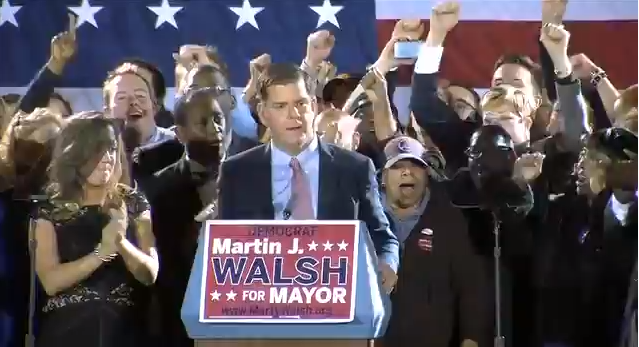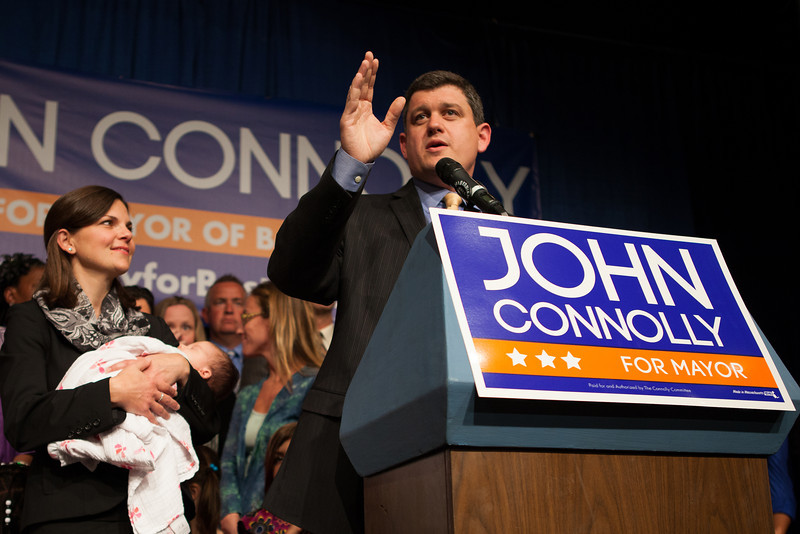Walsh Celebrates Win On Election Night

Marty Walsh wins Boston mayoral election. BU News Service’s Jamie Bologna was at the mayor-elect’s election night party.

Marty Walsh wins Boston mayoral election. BU News Service’s Jamie Bologna was at the mayor-elect’s election night party.


By Brittany Comak and Paula Sokolska
BU News Service
State Representative Martin J. Walsh emerged victorious in Tuesday’s Boston mayoral election, defeating City Councilor John R. Connolly and claiming 51.55 percent of votes, according to unofficial results from the Boston Election Department.
“Together we’re going to make Boston even stronger,” said Walsh in his victory speech.
Walsh will replace Boston’s current mayor, Thomas Menino, who is leaving office with an 82 percent approval rating, according to a Suffolk University/Boston Herald survey conducted last July. Menino boasts a 20-year legacy in which his administration experienced no scandals, ushered in a series of progressive measures like Greenovate Boston and Boston Bikes, and most recently coordinated the massive response effort to the Boston Marathon Bombings. Menino is the city’s longest serving mayor, having held office since 1993.
Bostonians were ready for the change, as 51 percent of registered Boston voters expressed the desire for a mayor with a “different style,” the same study cited. Menino’s decision to not seek re-election ignited a crowded preliminary race of 12 possible contenders. Walsh led the preliminary election with Connolly at a close second, and the two advanced.
Voter turnout for Tuesday’s election reached 40.19 percent, the Election Department unofficially reported.
Outside of the James F. Condon Elementary School in South Boston, a polling station for ward 6, precincts 1, 2, and 3, a steady stream of voters filed through a courtyard littered with discarded pamphlets and candidate stickers to cast their ballots at the end of the work day.
A black pickup truck cruised down West Broadway promoting Walsh for Mayor over a stereo system in its trunk. Canvassers for both candidates could hear its muffled advertisements, as they stood in the cool night air appealing to residents in a last effort to sway votes.
“It was a hard decision,” said Anna McGrath, a teacher who voted for Connolly. McGrath expressed frustrations over the lack of diversity in the candidates’ platforms. When asked how she made her decision McGrath said, “I think it comes down to the feeling that you have.”
Faced with a choice between nearly identical platforms, McGrath and other voters turned to gut feelings and intuition in their decision making. “Unable to distinguish themselves on the issues, City Councilor John Connolly and state Rep. Marty Walsh turned to biography,” noted a recent WBUR article after the candidates’ final debate. However, even on this personal front, voters found little difference between the candidates.
“They’re both white guys with Irish last names,” said Mike Phippen, 34, a recent law school graduate who voted for Walsh.
The lack of diversity that frustrated Phippen was evident in the candidate’s stances on major city issues. Their only explicit contention was in regards to the mayor’s term length. Connolly expressed support of a restriction, Walsh did not, according to a Boston.com infographic comparing their platforms.
“I thought it was very difficult to distinguish between the two, and that I found disappointing,” said Phippen.
But the mood at the Walsh headquarters at the Park Plaza was jubilant as the newly elected mayor assured voters of his commitment to move the city forward.
“Stand with me, because I’m ready to stand and work with you,” he said. “If we set our sights high, then Boston, I promise you, the best is yet to come.”

By Iris Moore
BU News Service
John Barros and supporters waited for the results of Boston’s mayoral preliminary election on Tuesday night at Restaurante Cesaria in Dorchester. When the big-screen television confirmed Barros’ loss to Martin Walsh and John Connolly, the party did anything but end. Instead, it started.
Between the signing and dancing it was hard to tell whether Barros had earned a spot in the November election. People in the room smiled and laughed as they sat together for one shared reason—to support Barros.
The positive atmosphere was contagious. One supporter stood on a chair and chanted, “we won the fight. We did our part.”
When Barros reached the podium with his wife and two sons, he paused, looked around the room, and smiled.
“We won this,” he said. “We changed the conversation in Boston. We changed politics in Boston,” he added.
Barros’ expressed gratitude throughout his concession speech, saying, “there are way too many people to thank. This is the best team in Boston.”
Starting at 6:00 a.m., supporters of Barros went door to door encouraging people to vote.
“Canvassing has made a difference in this campaign. It makes your interaction with voters more personal,” said Lisa (De Santos) Barros, the candidate’s sister.
According to unofficial results, Barros won 9,138 votes, or about 8.10% of votes cast.
After giving thanks to his supporters, Barros gave thanks to the city of Boston and the 11 other candidates for making this a civil race.
With a campaign focused closely on issues of public education and affordable housing, Barros stressed the importance of November’s final election. He acknowledged that although the race has ended for him, the race for Boston’s next mayor continues.
“Our involvement should not end here. We need to make sure we pick a leader that will lead us the right way,” said Barros.
According to Barros and supporters, the end of his political career is far from near. “I’m not going anywhere,” he said.
“This is just the beginning,” repeated Tome Barros, the candidate’s first cousin.
Domingas Amado of Cape Verde said she wasn’t worried about what Barros will do next. After knowing Barros for 15 years, she was confident he would find something else soon enough.

By Ashley Davis
BU News Service
ROXBURY–City Councilor John R. Connolly secured a place in the November Boston mayoral election Tuesday night after tallying the second-most votes in the preliminary Boston municipal elections.
“I have never been more thankful to be in second place in my life,” Connolly said, addressing his campaign party’s reception Tuesday at Hibernian Hall in Roxbury.
Connolly will oppose state representative Martin Walsh.

The November election will name the successor to Boston Mayor Thomas Menino, who will retire following 20 years in office.
Connolly took the stage in Roxbury as final votes were tallied–fitting to his campaign platform–to the chorus of Jackson Five’s “ABC 123.” Connolly’s focus on education reform is one of the most emphasized pieces of his mayoral campaign.
“I’m running for mayor because I know that together we can transform our schools so that every child receives a high-quality education,” Connolly said at the reception. “And together we can build safe and healthy neighborhoods–and ensure that everyone has access to great jobs.”
Connolly’s connections to education were emphasized throughout the night through references to both his previous employment as a public-school teacher and also the number of campaign supporters who are parents with school-age children in the Boston area.
Yet not all of Connolly’s supporters are singularly focused on his dedication to education reform. Some, like Sherry Dong of Jamaica Plain, were drawn to working with the Connolly campaign for the overall progressive attitude that they feel he would bring to the office.
“I’ve known [Connolly] since he was on the council and I’ve seen how open and representative he is of the whole city,” Dong said. “So, to me, it’s the balance that he represents and the vision and new ideas that he brings.”
Dong said that moving forward Connolly’s campaign has a clear differentiation from Walsh, which should aid decisions for undecided voters.
“I think the two candidates are very different,” Dong said. “It will make a clear choice for people.”
Dong echoed Connolly’s reception address remarks that the campaign has busy weeks ahead, amping up the campaign to attract voters like Luis Groz of Boston who did not go out to vote tonight.
Groz plans to vote November 5 but did not visit the polling stations Tuesday. He said he felt that many were waiting to vote after the pool of 12 candidates had been narrowed in Tuesday’s preliminary.
Others, like James Peterson of Roxbury, who voted for Charlotte Golar Richie, will need to be swayed from other preliminary candidates.
Peterson, who is concerned with crime and safety, said it was straightforward for him what a candidate would need to do to earn his vote: “I need people more involved in the community.”
Connolly, rallying supporters to build momentum, will continue his campaign tomorrow.

Rachel McCubbin
BU News Service
Minorities in Boston were empowered by Charlotte Golar Richie’s campaign for mayor despite the candidate’s loss, her supporters said.
“Charlotte Golar Richie may not be the next mayor, but she’s the first black woman to run and make a name for herself,” said professor Charles Ogletree of Harvard Law School, senior advisor to Golar Richie. “We’ve opened up dialogue all over Boston.”
Golar Richie came in third in the preliminary Boston mayoral election on Tuesday night, earning 13.8 percent of the popular vote. Even though she lost to Martin Walsh and John Connolly and she will not be continuing in the race, Golar Richie’s supporters at her campaign celebration at the Fairmount Copley Plaza still believed that she made a difference for the city.
“Charlotte has a lot to offer,” said Patricia Lynch of Mass Women’s Political Council, which endorsed the candidate early on. “Of course I’m disappointed.”
Lynch said she hoped that women of Boston will follow Charlotte’s example.
“We need more young women to put themselves on the line,” said Lynch.
Golar Richie represented more than just the female community, according to her supporters. She wanted all minorities to feel they had a voice.
“We wanted to be a bigger and better city,” she said. “And not just for some of us—for all of us.”
“The campaign wanted to capitalize on the minorities,” said Kim Vermeer of the South End, a volunteer for Charlotte. “The minority communities are mobilizing and making their voice heard.”
Vermeer was one of many wearing a sticker that proclaimed, “I voted in honor of Trayvon Martin,” right below her “Charlotte Golar Richie for Mayor” badge.
“If you talk about Charlotte Golar Richie, you better talk about Trayvon Martin,” said Ogletree.
Golar Richie joined rallies to protest the not guilty verdict in the trial of George Zimmerman this summer. She thought the trial was an issue important to both minorities and young people of Boston.
“We want our young people to know that they have a stake in this city,” she said on Tuesday night. She mentioned the youth forum she hosted to talk about the Zimmerman trial, saying that she hoped Walsh and Connolly would take up the dialogue with young voters.
“Young people aren’t just the future leaders of our city, they are the leaders of our city right now,” she said.
Golar Richie specifically thanked all her young supporters. She had many young men and women, some not even old enough to vote, present at her campaign celebration on Tuesday.
The race is over for Charlotte but she does not plan on letting her plans for the city end with her campaign. She plans on speaking to both Walsh and Connolly about her ideas for housing, gun control and job creation in Boston.
Martin Walsh finished on top in the Tuesday night preliminary, clinching 18.5% of the vote. John Connolly came in second with 17.2%. The two candidates will face off in the November general election.